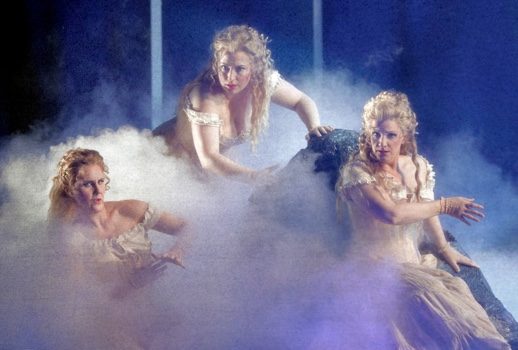
“Beware of her fair hair, for she excels / All women in the magic of her locks…”
Mahler’s adage that “a symphony must be like the world; it must contain everything,” may be a tired cliché today—the stuff of orchestra brochures and pre-concert lectures. But it captures one of the most fundamental urges in romantic music: to create a self-sufficient, unified whole. This instinctive desire for wholeness is perhaps clearest in the evolution of the symphonic slow introduction during the nineteenth century, from a pompous French overture into a sort of startup kit, containing the source material for the entire work.
Introductions like Beethoven’s 4th, Schumann’s 2nd or Mahler’s 1st seem to give birth to an entire half-hour or hour-long symphony ex nihilo: from a unison sustained pitch or a single motive springs everything. But what about a single note that contains the genome of a 15-hour mega-opera and an entire mythical world? Such is the opening E-flat of Das Rheingold, one of the most pregnant and portentous notes in Western music.
From that single pitch in the bass, the world of Wagner’s Ring seems to spontaneously build itself, the purifying waters of the Rhine washing redemptively over us with each arpeggio, beckoning us back to the comfort of infancy. With the gradual introduction of passing and non-chord tones, the world becomes sharper, more defined, more inexhaustible, until at last the sparkling voice of a young water maiden speaks to us above it all.
And so Wagner builds the world that he (or we) will proceed to destroy over the next week. It’s time for another Ring cycle at the San Francisco Opera, after a seven year hiatus. This week (and the following two weeks), director Francesca Zambello is bringing an updated version of her production back to San Francisco, with Donald Runnicles conducting the SF Opera Orchestra, featuring Iréne Theorin as Brünnhilde, Greer Grimsley as Wotan, Daniel Brenna as Siegfried and Falk Struckmann as Alberich.
Over the coming week, I will be sequentially reviewing each work in the tetralogy, beginning with Das Rheingold, which was last night, continuing with Die Walküre tonight, Siegfried (on Friday) and Götterdämmerung (on Sunday).
The Ring presents a director with more choices, and more consequential choices, than just about anything else in the repertoire. But the foundational choice is what exactly this 15-hour marathon is about. Is it a battle cry against those so hubristic as to commodify our world—a two-fronted attack on both capitalists and kings—culminating in the defeat of pride at the hands of love?
That approach has plenty to recommend it. It accords The Ring at least a superficial relevance in all times—after all, there is barely a generation that doesn’t fear that it stands on the precipice of self-destruction by its own greed and decadence. Such a concept also offers an opportunity for a more realistic, human approach to costuming and setting. It dramatizes the thinly veiled humanity of Wagner’s gods and demigods.
And then there is the fact that casting Wagner as a political visionary for our times offers us a kind of palliative balm. There is barely an artist who hears the majesty of Wagner’s music and doesn’t immediately start building a case in his mind arguing that we can compartmentalize the detestable aspects of Wagner away from his pristine art. Casting The Ring as a parable for the state of the current world, seen through the eyes of a progressive urban opera lover (and not an early German nationalist), offers us just such a soothing self-justification.
There are, however, other legitimate interpretations. Most compelling, perhaps, is the psychological one, which casts the cycle as an inward drama in each human soul—one in which the individual, as Father M. Owen Lee so beautifully put it in his Met Lectures, “wrests consciousness from nature.” As in the Garden of Eden, only by throwing the world around us (or ourselves) into imbalance, only by doing the unnatural, do we gain knowledge and become truly human.

The former approach is the one that director Zambello favors in this production. In yesterday’s Rheingold, the realm of the gods was a veritable country club adorned with chaise lounges and bottles of champagne. The white jackets and striped ties of Donner and Froh looked straight out of the Martha’s Vineyard of Dominick Dunne’s Season in Purgatory.
And in Alberich’s Temple of Doom-like Nibelung lair, the dwarf had all the bearing of a sweatshop overseer as he squeezed each scrap of gold out of his subjects’ miserable hands. Zambello made a conscious decision to make these settings appear more vivid and more human than the opening scene on the Rhine, where the Alberich and the maidens’ cat-and-mouse game occurs behind a scrim.
While the opera’s original sin takes place apart from us, behind a blue and gold mist, we realize in our first view of the Gods—both from the way they dress and behave and from our proximity to them without a mediating scrim—that they are more man than God. This approach must have been an exciting one for the cast from an acting perspective—men are, after all, more interesting than gods. And indeed the cast of Rheingoldmostly seemed to be inspired by it.
Perhaps the evening’s best performance came from bass-baritone Struckmann, as the shape-shifting dwarf Alberich in his SF Opera debut. Given a choice between playing an insincere huckster or a deeply flawed man lurching from one base passion to the next, Struckmann chose the latter, to great effect.
His courtship games with the Rhine Maidens were warm and puckish, showcasing a sparkling lyricism, but at the moment when he saw his first wisp of gold on the banks of the Rhine, his musical persona changed, as if tearing off a mask: all warmth gave way to steely authority. By the next time we saw Alberich, at Wotan and Loge’s underground visitation, he had transformed into a combination of his earlier two personas, combining bravado and boastfulness with an unforgiving fury.
Struckmann’s explosions at the dwarves were so terrifying that they seemed to shock the orchestra into silence. And as he boasted to Wotan that he would one day rule the world, and the Nibelungs “would rise again” (a clear orchestral allusion to Schubert’s “Erlkönig,” by the way), he made us wonder, if only for a moment, who was the real oppressor—he or Wotan.
As far as our moral estimation of them, the gods did little to help their own cause, and I would guess this was Zambello’s intent. Her concept was highly effective in the case of Loge, allowing tenor Stefan Margita to turn in the other standout performance of the evening. Margita’s portrayal of his character was decidedly Robin Hood-ish—devious, ruthless, and yet impossible to hate. Approaching the part with an almost Irish-sounding ballad-like style and very discreet vibrato, his tone conjured memories of Harry Plunkett Greene in its lightness and textual clarity.
Grimsley as Wotan was less effective, however, giving me some concerns about how he will fare as an increasingly central, vulnerable and tragic character over the coming days. Wotan is (even in Rheingold) a much more complex character than Loge, but I still found myself somewhat bored. Unfortunately I think this was in no small part due to Zambello’s decision to have him played as a useless fop.

It was only at the end of the opera, when Wotan abandoned his foolish determination to keep the ring, that his voice seemed to take on a deeper, less metallic quality. It seems as though in a purely vocal sense, sincerity seemed to suit Grimsley better than vain pretense. That fact gives me hope that as his vanity is increasingly stripped away in Die Walküre, his performance will proportionally take on a new vitality.
In Das Rheingold, Wagner uses goddesses as Wotan’s conscience, foreshadowing Brünhillde’s intercession in Die Walküre. But like the men in their lives, Wagner’s goddesses are far from perfect. In the role of Wotan’s wife Fricka, Jamie Barton gave a matronly if understated performance. The degree to which she came alive—as she daydreamed about Wotan keeping his stolen gold and crafting jewelry out of it for her—helped illustrate the depth of Alberich’s curse.
In the role of Freia, the goddess of youth, Julie Adams turned in a stellar performance. When Adams first entered the stage to remonstrate with Wotan, dragged by the giants as their price for constructing Valhalla, she sang as if shot out of a cannon—incisive, urgent, and well-projected. Particularly notable was the tone she mustered as she chirped “Am I worth so great a ransom?” while lying on the floor beneath a pile of “gold.”
But even more impressive was contralto Ronnita Miller as the earth goddess Erda, whose Scene Four prophecy that “all that exists shall end” was delivered with richness and ominous portent. I very much look forward to seeing her again in Siegfried on Friday.
Other strong performances included the trio of Stacey Tappan, Lauren McNeese and Renée Tatum as the three Rhine Maidens. All three were able to perfectly smooth the edges between their tone and the sprinkling water of the violins and woodwind section, making it difficult to tell where one ended and the other began. Their ensemble singing showed an impressive emotional range, able to oscillate between dark (“Who would give up love?”) and light, as well as a tightness of intonation that is relatively uncommon in the SF Opera’s supporting trios.
As the terrifying and covetous giants Fasolt and Fafner, Andrea Silvestrelli and Raymond Aceto turned in committed performances (with massive shoes and stilts, no less). Silvestrelli’s menacing, melodically disjunct unison lines with the orchestra were particularly well balanced and forceful. And in the role of lesser gods Froh and Donner, Brandon Jovanovich and Brian Mulligan provided just the right dose of smug self-satisfaction.
Regarding Zambello’s decision to set the tetralogy in (as we have noted) a metaphysical Martha’s Vineyard, the jury is still out. Das Rheingold might be the most mythical, and least human, of the cycle, so I will suspend judgment until I see how Zambello’s concept plays out moving forward. It does concern me slightly, though, that the concept seems to be having a limiting effect on the expressiveness of some of the singers (particularly Grimsley as Wotan). Whether Grimsley will grow into Wotan’s mortal, human side over the next few days is a major question.
And most important of all, we will soon have our first encounter with Theorin, an eleventh-hour substitution in the role of Brünnhilde, in her first complete Ring Cycle in the United States.
For those hoping for some reflections on the orchestral performance, sets, costuming, or other aspects, there will be plenty to come over the next few days!
Photos: Cory Weaver



